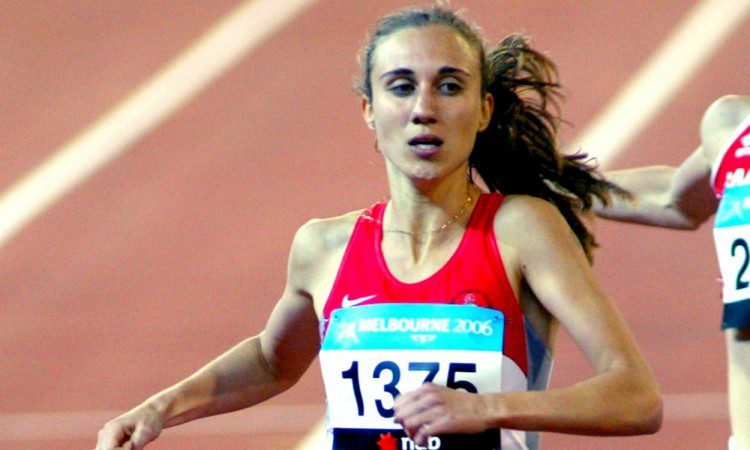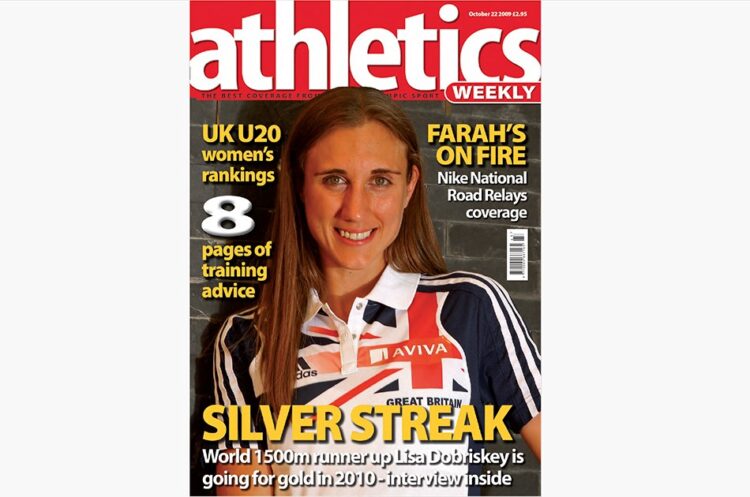
[ad_1]

Joyous 1500m winner at the 2006 Commonwealth Games saw her Olympic dreams ruined by cheats and she couldn’t bear to watch the Paris Games this year
When Lisa Dobriskey first broke on to the international athletics scene with a surprise Commonwealth 1500m victory in 2006, she was a bubbly athlete with the world at her feet. Such was her shock and excitement at winning gold at those Games in Melbourne, she even forgot to do a lap of honour.
As the 22-year-old bounced dizzily into the media mixed zone after her race at the Melbourne Cricket Ground, seasoned sports journalists who knew nothing about her hurriedly asked AW who on earth she was and where she’d come from. With a wide grin, she then told them: “It’s a real honour to succeed Kelly Holmes as champion. Kelly’s a Kent girl like me.”
Now aged 40, Dobriskey has bitter and angry memories of the sport and could not even bring herself to watch the Paris Olympics on television this year. This is largely due to the bruising experience of the London 2012 Olympics when she placed 10th in the 1500m final with five athletes ahead of her – the latest being Tatyana Tomashova – subsequently receiving a drugs ban.
For many, it is hardly a surprise. Moments after finishing the race in London, Dobriskey told the press that she didn’t believe she was competing on a level playing field. “I’m not someone who makes that sort of comment lightly,” Dobriskey told The Times this month, reflecting on those London Games from 12 years ago. “I knew my sport so well and I knew what I was saying was grounded and true.”
Late in the evening after the now infamous London 2012 final I wrote an online blog headlined “Turkish delight or doubt?” referring to the one-two of Asli Cakir Alptekin and Gamze Bulut who had boasted at their post-race press conference: “We came here to take gold and silver. This is Turkish power!”

Asli Cakir Alptekin (Mark Shearman)
The article struck a chord with readers and became one of our most popular posts during the Games. Despite social media being its relative infancy, British miler Anthony Whiteman called the race “embarrassing” while London Olympian Nick McCormick described the women’s 1500m as “dead”.
Prior to London, Cakir Alptekin had already served a two-year drugs ban while she was still a teenage athlete, whereas Bulut improved her 1500m PB by a whopping 17 seconds in 2012 alone. “I took six tests in a month, before and after the race,” said Alptekin, on hearing Dobriskey’s accusations. “I don’t care what she says. These statements only reflect her personality.”
On being unable to watch the Paris Olympics this summer, Dobriskey told The Times: “I just can’t. It hurts so much. I didn’t want to stop running but my body gave up,” she says. “I tried to get back to watching but it’s just too painful, and makes me spiral and get in a mess mentally. Now 2012 feels almost comical. I was fifth but never finished fifth.
“After all I’d been through I’d have celebrated fifth, gone to watch the medal ceremony, gone to see Mo [Farah] race, soaked it all in, but I just wanted to run and hide. I didn’t want to be anywhere near that stadium. I get goosebumps thinking about the crowd in the heats, just phenomenal, but I try to erase the final and pretend it didn’t happen.”

Lisa Dobriskey (Mark Shearman)
In the early part of her career, Dobriskey always seemed to run with a smile on her face. She began dating the 800m international Ricky Soos, with the duo being subbed the ‘Posh and Becks of British athletics’. Today, she is working as a pilates instructor in Arizona and clearly has largely bad memories of international middle-distance running.
In addition to the Turkish one-two and Tomashova in the London Olympic 1500m, Natallia Kareiva of Belarus and Ekaterina Kostetskaya of Russia were later banned and had their results annulled. Of course Dobriskey wasn’t the only loser that day either as GB team-mate Laura Weightman has moved from 11th to 6th. Third placer in the race, Maryam Yusuf Jamal of Bahrain is now regarded as the champion.
The women’s 1500m at London 2012 has been dubbed the ‘dirtiest race in history’ but there are plenty of other contenders for this dubious honour from that era. Four years earlier, for example, Dobriskey finished fourth in the Olympic 1500m final in Beijing with one of the athletes ahead of her that day, Nataliya Tobias of Ukraine, later getting a drugs ban for testosterone use, although her 2008 result has survived.
“I have never, ever got over it,” Dobriskey says. “There’s not a day that goes by when I don’t think about it. It kills me inside.”

Lisa Dobriskey (Mark Shearman)
Tobias wasn’t the only cheat in the 2008 Olympic 1500m either, as Anna Mishchenko of Ukraine and Anna Alminova of Russia from that race were later banned for doping.
Behind Holmes in the Olympic 1500m in Athens in 2004, meanwhile, the runner-up Tomashova and fourth-placed Natalya Yevdokimova from Russia, plus Daniela Yordanova of Bulgaria, Elvan Abeylegesse of Turkey and Olga Yegorova of Russia all received drugs bans during their careers.
Dobriskey aside, spare a thought for Hayley Tullett, who finished third in the 2003 world 1500m final in Paris behind Tomashova and another drugs cheat, Süreyya Ayhan of Turkey. Given this, it’s fair to say that Tullett is the de facto world 1500m champion from 2003 but has she received the fame and rewards befitting such a feat?
At least Dobriskey managed to win a global medal – silver in the 2009 World Championships – although it’s fair to say the bad experiences outweigh the good ones from an era of middle-distance running that was, with hindsight, rotten to the core.

» You can find our original reports from the events mentioned above in our AW archive here.
» Subscribe to AW magazine here, check out our new podcast here or sign up to our digital archive of back issues from 1945 to the present day here
The post How doping cheats wiped the smile from Lisa Dobriskey’s face appeared first on AW.
[ad_2]
Source link



